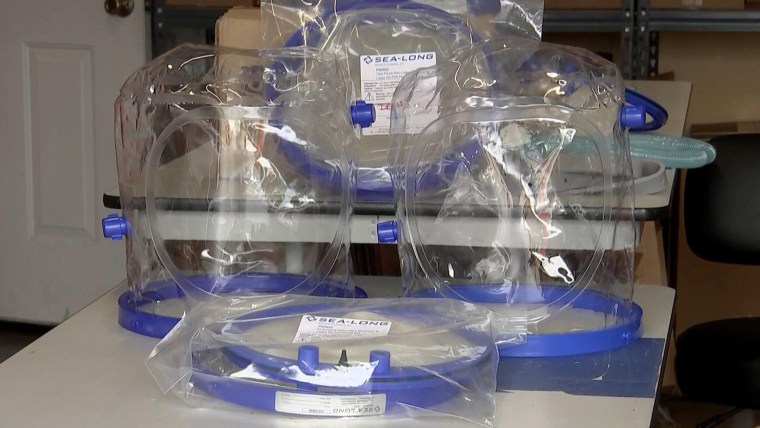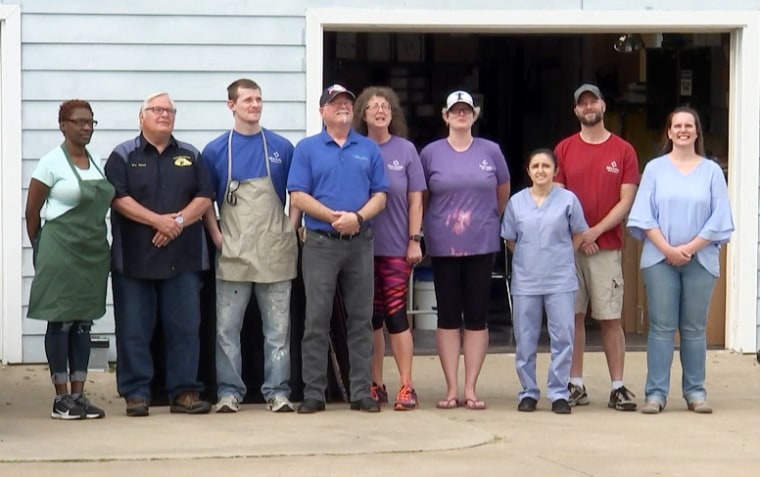By Lisa Cavazuti, Cynthia McFadden and Rich Schapiro
One month ago, Chris Austin was running a little-known mom-and-pop business in Texas that fielded a few dozen orders a week for his helmet-style ventilation devices.
He had five employees and a handful of volunteers from the family's church who would pitch in at the workshop behind their home in the small town of Waxahachie.
Then the coronavirus epidemic hit.
Austin's company, Sea-Long Medical Systems Inc., is getting thousands of orders every day, from America's top hospitals to countries as far flung as the United Arab Emirates. Researchers say the device, which costs less than $200, could help hospitals free up ventilators for only the most critically ill coronavirus patients.
"'Overwhelmed' doesn't scratch the surface," Austin told NBC News.

The demand for the Sea-Long helmet underscores the dire shortage of ventilators in the U.S. and around the globe fueled by a surge in hospital patients suffering from COVID-19.
In the last few weeks, hospitals have been flooded with patients experiencing respiratory problems so severe they need the help of a machine to help them breathe.
Governors have made impassioned pleas for more equipment. Companies like General Motors and Ford have redesigned their assembly lines to produce the lifesaving devices. And hospital executives are scrambling to snap up any equipment that might help ease the escalating crisis playing out inside their facilities.
The Sea-Long device doesn't look the part of a lifesaving medical device. It resembles a crude spacesuit helmet, with a transparent hood sealed at the neck and two tubes extending from its base. The helmet was originally designed to supply oxygen to patients receiving treatment in hyperbaric chambers.
But doctors in Italy, where a version of the helmet has long been used to treat people experiencing breathing problems, found it to be effective in helping some COVID-19 patients.
Dr. Bhakti Patel, who has been studying the devices for four years, said they hold promise as an early intervention that could spare respiratory patients the need to be put on the more traditional — and costly and invasive — ventilators.
"I would love for there to be a silver bullet for this pandemic," said Patel, a pulmonologist at the University of Chicago. "My best hope is that the way it changes the game is that maybe it shaves off the number of patients who need a ventilator — even if it's 1 out of 3 or 1 out of 5."
"If that is the case," Patel added, "that would be a game changer when we're seeing this tidal wave of patients who need a ventilator."
Patel led a first-of-its-kind study in 2016 that tested the Sea-Long helmet against an oxygen mask for a group of 83 intensive care patients suffering from acute respiratory distress. The researchers found that the helmet led to superior outcomes: Patients using them required ventilation 18.2 percent of the time, compared to 61.5 percent for the masks, and had a better 90-day survival rate, according to the study, published in the Journal of the American Medical Association.
The trial was stopped early because the helmets proved more effective than the masks, resulting in a smaller sample size than originally intended. But Patel believes the device could lead to a sea change in intensive care units that have long relied on traditional ventilators. Those devices require doctors to fully sedate patients and insert a tube into their windpipes, a process that can cause pneumonia and other problems when used for extended periods of time.
"If we take away the ventilator — which comes with this package of sedating people, making them not move, making them sort of not have memory of what's happening — perhaps we could spare some patients some long-term complications," Patel said.
At $162 apiece, the Sea-Long helmet costs a tiny fraction of the five-figure ventilators.
The original devices were made to run through ventilators. But working with Patel and her mentor, Dr. John Kress, Sea-Long has modified the helmets so they can be hooked up to a hospital's regular oxygen supply, keeping the ventilators free for those who need them most. They have also made another significant modification, adding a viral filter to prevent possible COVID-19 exposure to others.
This week, the team at the University of Chicago Medical Center used the helmet on one coronavirus patient and has gotten encouraging results, Kress said. The facility has received 20 of an expected 100 helmets and is planning to use them on additional patients, the doctors said.

Other companies make similar ventilator helmets, but Sea-Long's is the only helmet available in the U.S. that meets requirements of the Food and Drug Administration and has been validated in a clinical study for acute respiratory syndrome. No studies have yet been done, however, examining the effectiveness of the devices in treating COVID-19 patients.
Austin's team has been working around the clock for the past several weeks. The workforce has at least doubled to more than 10 people, Austin said, and volunteers have been showing up in droves.
"We have people showing up that we don't even know that say: 'We're here to help. What can we do?'" Austin said. "They don't ask for anything. They don't expect anything. They just say, 'Whatever you want me to do, we'll do it.'"
"It just about brings tears to my eyes," Austin added.
The attention has led to some other acts of extraordinary generosity.
Austin said he recently got a surprised call from Virgin Galactic CEO George Whitesides offering to help him produce more devices.
"Chris, I saw what you do, and we want to help," Whitesides said, according to Austin. "Whatever it takes."
Austin told him he needed more machines to manufacture the devices but didn't have the cash to pay for them. Later that day, Austin got a call from his New Jersey-based supplier.
"Somebody just paid your bill," Austin said he was told. "They'll be shipping tomorrow."
With the four additional machines, Sea-Long expects to produce thousands of helmets a week. The goal is to produce 50,000 per week.
"This is the classic sort of American story," Patel said. "It's the little engine that could."
Download the NBC News app for full coverage and alerts about the coronavirus outbreak
James Vanderploeg, Virgin Galactic's chief medical officer, said the company is working with Sea-Long "to help them expand their capacity, helping with recruiting additional people and getting equipment in place and helping with the logistics and so forth — anything we can do to help them expand their throughput." Virgin Galactic is also modeling potential prototypes for its own design of helmets used for ventilation, Vanderploeg said.
Major U.S. medical centers are now stocking up on the helmets, including Massachusetts General Hospital and the Hospital of the University of Pennsylvania. Austin said he's also received orders from Canada, Mexico and several countries in Europe, including hard-hit Italy.
A Mass General spokesperson said the hospital has ordered five Sea-Long helmets but has not yet received them.
A Penn Health spokesperson confirmed that the hospital has ordered the devices.
With so much of the world in need and so many orders coming in at once, Austin has faced a difficult question: Whom to prioritize?
"We really look at where is the need," Austin said. "We know New York has a stronger need. We know Boston. We know Chicago. ... But we also know that we have to get what we can to Italy."
For now, the company is shipping only a limited number helmets per order, "because we still can't afford the volume of a huge order," he said.
Amid the worsening pandemic, Sea-Long isn't planning to raise the price in part because it doesn't want to limit who has access to the devices.
"This probably sounds sappy," Austin said, "but we think of what if that was our son or daughter or grandfather sitting there in that bed gasping for air and we have to explain to him: 'I'm sorry. We don't have anything for you.'"



No comments:
Post a Comment